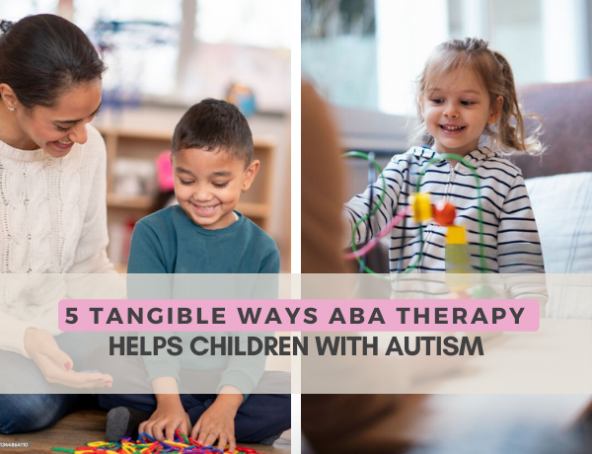5 Tangible Ways ABA Therapy Helps Children with Autism

Applied Behavior Analysis ("ABA therapy") has long been considered one of the most effective treatments available for children with autism spectrum disorder (ASD). Its evidence-based approach focuses on understanding and modifying behavior to improve social, communication, and cognitive skills. ABA therapy utilizes a variety of techniques and strategies that are tailored to each individual's needs. To get a better understanding of the impact ABA therapy can have, this blog discusses 5 tangible ways that ABA therapy positively impacts children with autism, helping them develop essential skills and improve overall quality of life.
5 Benefits of ABA Therapy for Children with Autism
1. Communication SKILLS
There is no more important objective than helping your autistic child communicate. No two individuals on the autism spectrum have similar communication skills, so each child will require a customized plan and method for communicating. For some children, vocal communication will emerge and serve as an effective way of sharing needs, ideas, and emotions. Many children have success using alternative communication methods. In many cases, several methods of communicating including vocal speech, gesturing, speech output devices, exchanging physical pictures, typing, or even sign language will be used, often in combination, to produce meaningful and robust communication. Regardless of the methods used, teaching your child an effective way to communicate is the most critical objective. Parents should prioritize this objective as soon as possible and work with a provider to develop effective strategies. With consistent and continued practice, most children can develop an effective way of expressing their preferences and thoughts. ABA services can be immensely helpful at this critical stage, since mastering effective communication requires practice for several hours a day.
2. SOCIAL relationships
Impairment in social communication is a core characteristic of autism and many individuals will find social interactions challenging. Despite these challenges, many autistic people express the need for meaningful relationships. These relationships may sometimes appear different than non-autistic relationships, but building and maintaining trusting bonds with other people is a universal part of the human experience. In early childhood, one of the first relationships that your child will form outside of your family is with a service provider. In an ABA based intervention, your provider will begin by building a safe, trusting relationship with your child. While this may take time, a trusting relationship is the foundation for all future interactions. As your child’s preferences and strengths begin to unfold, ABA providers will create opportunities for meaningful social interactions. ABA interventions use methods designed to break complex skills into small, bite-sized steps that your child can master with confidence. Using these procedures, your child can begin to develop the foundations for meaningful interactions with family, peers, and individuals in the community.
3. ABILITY TO Self-advocate
A fundamental way ABA helps is empowering children with autism to become self-advocates. Because it recognizes the universal right for individuals to make decisions in their own lives, it focuses on helping these children express themselves effectively. Children learn to communicate when something is challenging for them, enabling them to ask for help and request accommodations as needed. It also equips them with the ability to assertively tell someone to stop if they are uncomfortable or need a break, and to set personal boundaries. By providing these essential skills, ABA therapy fosters greater independence and self-advocacy in children with Autism, enabling them to navigate the world with increased confidence and autonomy.
4. IncreaseD independence
As children grow, they gain important skills for independence. When autistic children struggle to gain age-appropriate independence during daily routines, ABA interventions can be a vital way to teach these skills. In preschool aged children, ABA providers can help with activities like toilet training, using utensils, riding a tricycle, or just playing with toys. As your child ages, ABA interventions can help prepare your child to live with increased independence. Common activities include dressing, washing hands, tying shoes, preparing snacks, and picking up toys. In teens and young adults, providers may practice activities in the community such as making retail purchases, creating a daily schedule, or effectively using technology.
5. FUTURE LIFE OPPORTUNITIES
In the end, improving your child’s quality of life is the only objective that truly matters. Whether it’s to ensure their physical heath through developing strong exercise routines, establishing a sense of belonging and teamwork through sports or clubs, teaching how to make choices in their life, encouraging personal growth through hobbies and special interests, or working in a vocation that interests them, ABA interventions are proven to be effective at improving overall quality of life for autistic individuals. Your ABA service provider should work with you to uncover the most important long-term goals and develop skills that will help your child achieve these valued outcomes in the years ahead.
ABA therapy offers tangible and effective ways to support children with autism in developing essential skills and improving their overall quality of life. By focusing on skill development, behavior management, independence, and generalization, ABA therapists play a crucial role in helping children with autism reach their full potential. The personalized nature of ABA therapy ensures that each child's unique needs are addressed, promoting meaningful progress, and fostering a brighter future.
AZA United provides ABA Therapy at these locations:
- West Valley Center (WVC) in Avondale
- East Valley Center (EVC) in Mesa
- Home-based services across all of Maricopa County
Contact our Family Support Team if you would like to learn how to get started with ABA Therapy or any other programs and services that we offer. Our Family Support Team is always available to help and is available at no charge to all members of the autism and developmental disability community. Schedule a free phone appointment that works with your schedule by visiting AZAunited.org/supportcall
You may also be interested in:
For more helpful resources and information, follow AZA United on social media:






